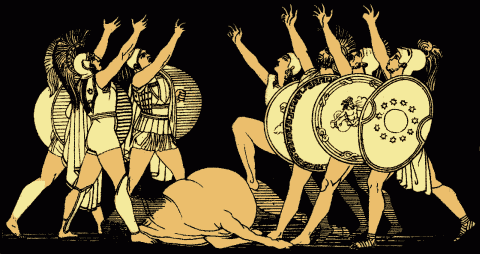PARTHENOPAEUS IN GREEK MYTHOLOGY
Parthenopaeus was a famous hero of Greek mythology; famed for fighting at Thebes, in the generation before the events of the Trojan War.
Parthenopaeus Son of Atalanta
|
Most commonly, Parthenopaeus is named as a son of the heroine Atalanta, fathered by Meleager, Ares of Melanion.
Atalanta not wishing to be shown to no longer being an a virgin, decided to abandon Parthenopaeus. Parthenopaeus was thus left upon Mount Parthenius, the son of Atalanta though was of course rescued by a shepherd before he died, and was cared for and raised by the shepherd and his family. At the same time, the shepherd also rescued, Telephus, son of Heracles and Auge, who had also been abandoned at the same time. Telephus and Parthenopaeus would grow up as good friends, and whilst the pair were still young, the two would fight together in Teuthrania, as the invasion by Idas was thwarted. Later, Parthenopaeus was a welcomed guest in Adrastus’ royal palace. Merely being a guest of Argos, did perhaps not offer a strong enough tie for Parthenopaeus to be given a prominent role in the Seven Against Thebes, and so an alternative parentage for Parthenopaeus is given as Talaus and Lysimache. Being a son of Talaus would make him brother to Adrastus and Mecisteus. |
|
The Seven Against Thebes
At the time Polynices of Thebes, was a guest of Adrastus, and an Argive army was raised to aide the son of Oedipus to gain the throne that his brother, Eteocles, refused to cede, as had been agreed.
The army was led by seven commanders, and although different sources provide different names, arguably the most famous list names the seven commanders as Amphiaraus, Capaneus, Eteocles, Hippomdeon, Polynices, Tydeus and of course Parthenopaeus.
Parthenopaeus was still young when he went to war, perhaps too young, at least in the eyes of his mentor, Dorceus. Parthenopaeus, although regarded as perhaps over-confident, and occasionally conceited, was nevertheless a great fighter.
The army was led by seven commanders, and although different sources provide different names, arguably the most famous list names the seven commanders as Amphiaraus, Capaneus, Eteocles, Hippomdeon, Polynices, Tydeus and of course Parthenopaeus.
Parthenopaeus was still young when he went to war, perhaps too young, at least in the eyes of his mentor, Dorceus. Parthenopaeus, although regarded as perhaps over-confident, and occasionally conceited, was nevertheless a great fighter.
Parthenopaeus at Thebes
|
There were seven gates at Thebes, and each of the commanders faced one, with their part of the Argive army at their back.
Again, different surviving sources tell of Parthenopaeus facing different gates. Eventually, though Parthenopaeus led his army against his allotted gate. The Theban defences remained strong though, and the Argive forces could not break through. |
|
As the fight for Thebes continued, and losses grew amongst the Argive attackers, Atalanta had a dream about the death of Parthenopaeus. Atalanta convinced Artemis to intercede upon her son’s behalf, but Apollo decreed that Parthenopaeus could not be saved.
So instead Parthenopaeus was granted the skill and strength to go on one final killing spree.
Parthenopaeus would kill many Theban soldiers, but eventually he would fall. Some tell of him being killed by Amphidicus, a descendant of the Theban Spartoi, others by Periclymenus, a son of Poseidon, or by Dryas, a chieftain from Tanagra who had come to Thebes’ aide.
Parthenopaeus, and the other Seven, would later be seen by Aeneas on the Underworld.
So instead Parthenopaeus was granted the skill and strength to go on one final killing spree.
Parthenopaeus would kill many Theban soldiers, but eventually he would fall. Some tell of him being killed by Amphidicus, a descendant of the Theban Spartoi, others by Periclymenus, a son of Poseidon, or by Dryas, a chieftain from Tanagra who had come to Thebes’ aide.
Parthenopaeus, and the other Seven, would later be seen by Aeneas on the Underworld.
Promachus Son of Parthenopaeus
Prior to going to war, Parthenopaeus was said to have married a nymph named Clymene, and became father to a son called Promachus.
Some also name another son of Parthenopaeus, Biantes, who was also said by some to have fought as one of the Epigoni, or at least with them.
Some also name another son of Parthenopaeus, Biantes, who was also said by some to have fought as one of the Epigoni, or at least with them.
|
|
Colin Quartermain - Parthenopaeus - 11th February 2024
